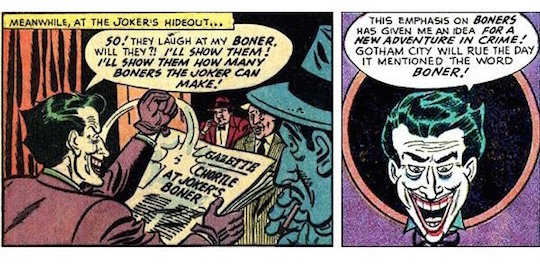“Everything is only for a day,” Marcus Aurelius writes in book IV of the Meditations, “both that which remembers and that which is remembered.” He means don’t worry about your historical reputation, because the people who know it will all die, too. Still, among the living, it’s hard not to hope posterity will like us. I think of my grandparents’ segment of history—from the Depression through fascism into boom decades culminating in the hypertrophied 1980s—and I am overwhelmed with admiration. Then I try to come up with titles for our chapter of the history books. “Deficits and Decay” seems toppable. “Where Animals Went” would work in a work of popular nonfiction. Today is Friday, and history might remember us as people who didn’t think about the future, but not in the good way like Marcus Aurelius wants. Won’t you chortle at the boners with me?
First, the good news: Watchman author and eccentric auteur Alan Moore has given a long interview. The bad news is nostalgia has kept the 21st century from developing its own expressions, because original works are forced out by the “ephemera of a previous century squatting possessively on the cultural stage.” Of course he is referring to Ant-Man. Moore does not oppose retreating into fantasy, but it’s troubling we retreated into the fantasies of another time:
It looks to me very much like a significant section of the public, having given up on attempting to understand the reality they are actually living in, have instead reasoned that they might at least be able to comprehend the sprawling, meaningless, but at-least-still-finite ‘universes’ presented by DC or Marvel Comics. I would also observe that it is, potentially, culturally catastrophic to have the ephemera of a previous century squatting possessively on the cultural stage and refusing to allow this surely unprecedented era to develop a culture of its own, relevant and sufficient to its times.
Then he tells Alison Flood that interviews suck and this was his last one. He also advances a reasonable argument that his plan to reclaim the Golliwog character was not racist, but uh…bold project.
Did you see what I did there? Alan Moore may have written a bunch of compelling stories that changed his chosen medium, but he needs to check his privilege. I told him that, so morality points for me. I’m still not as good as this guy:
My exhaustion last night did not stop me from taking 15 minutes to school a Bernie supporter on her white privilege. #NN15
— Zack Ford (@ZackFord) July 19, 2015
The humblebrag, the complaint, a person named Zack explaining white privilege: this tweet has everything. But the replies have even more, including his report that “When the Bernie fan said, ‘Bernie has talked more about race than Obama,’ I shut the conversation down, but explained why first.” Don’t worry: he got the last word. Bernie Sanders has definitely not talked about race more than Obama, and I think we can agree that if he did it would be a problem. Ford is not wrong, but there’s something awful about how he is right: “schooling” this old lady and then punishing her ignorance by shutting down the conversation. Surely she will acknowledge her white privilege and vote for Hillary now.
Fredrik deBoer mighty say this man has performed himself for an online space. He pretty much did on Twitter, albeit in a way that was possibly informed by frustration:
seriously why the fuck do people not just tweet “HELLO EVERYONE I AM VERY GOOD, OTHERS LESS SO” at this point https://t.co/viOveED8vW
— Freddie (@freddiedeboer) July 20, 2015
He expands on this idea at his blog, where he identifies three characteristic behaviors in online spaces:
- rejection of sincerity,
- prioritization of knowingness as most important trait, and
- adoption of the politics and language of the academic left.
To this list he adds (4) insularity, which I would call an epiphenomenon of the first three rather than a behavior. Ford’s righteous schooling of a woman who supports a political candidate he does not like features the privileged-based discourse of category (3) and constitutes a triumph of (2) knowingness over ignorance, culminating in the refusal to debate that is a product of (4). But it’s hideously sincere. I’m afraid deBoer’s theory doesn’t cover this one, unless Ford is running a fantastic deadpan. If he found a way to combine social-justice rectitude with irony, he might be unstoppable. As deBoer puts it:
The endurance of the permanently ironized life lies in the way that you can just turn that attitude back on critiques of it. I don’t know what it is, but between even the most accurate criticism of sarcastic engagement and sarcastic engagement itself, the latter always wins. Besides: insiderism requires outsiders against which to define itself, so every critical take provides the culture with the alternative it needs to sustain itself. lol meme lol gif lol lol.
I hope “lol meme lol gif lol lol” catches on as a way to shame people on the internet. Saying that on Twitter would be like going to China and shouting “ping pong ching chong,” except this time they deserve it.
Meanwhile, everyone else gets to shout “herp derp ketchup sports” at us for destroying the old Penn Station. Don’t look at this photo essay on the rise and eventual replacement of the hub that served 100 million passengers in 1945, unless you plan never to attend another Knicks game. “We will probably be judged not by the monuments we build but by those we have destroyed,” the New York Times elegized in 1963. But that was before anyone knew about Billy Joel, so they can be forgiven for not understanding the purpose of Madison Square Garden.




